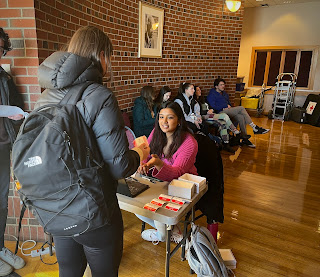A Maine student turns tragedy into a lifesaving endeavor
By Jennifer Costa, regional communications director
Sivani Arvapalli is an aspiring dentist, majoring in biochemistry at Bates College in Maine. Just two months into her sophomore year, unimaginable tragedy unfolded minutes from campus. The horrific event inspired the 19-year-old to add a new title to her resume – blood drive host.
“After the shooting that happened in Lewiston, I was motivated to help out in any way I could,” Arvapalli said.
 |
| Sivani Arvapalli, blood drive host |
“I looked online to see if I could donate blood – and every single slot was booked for the next three weeks, which was a beautiful thing, but I still really wanted to help out. So, I reached out to the American Red Cross to see if we could set-up a blood drive on campus so students across our community could help out too by donating blood,” she explained.
After months of planning, Arvapalli hosted her first blood drive on February 5th. The timing was critical. It occurred just days after the Red Cross declared an emergency blood shortage. U.S. donors had fallen to a 20-year low – and blood products were going out to hospitals faster than donations were coming in. With the blood supply critically low across the country, the Red Cross was forced to limit distributions of some of the most transfused blood types to hospitals.Further compounding the situation was the COVID-19 pandemic. The number of people giving blood in the U.S. had fallen by more than 300,000 since the coronavirus outbreak. During the height of the pandemic, blood drives sponsored by high schools, colleges and universities – often where young people make their first donations – were put on hold as schools shifted to virtual learning, restricting on-campus activities for the health and safety of their students. The impact to the blood supply was staggering. In 2021, about 260,000 donors ages 18-24 gave blood through the Red Cross – more than a 50% drop from just two years prior in pre-COVID times.
“Our young people have tremendous power to help save lives and build the next generation of blood donors. We need more youth leaders like Sivani,” said Sophie Piconi, executive director, Red Cross Central and Mid Coast Maine Chapter. “What she has set in motion at Bates College will have a lasting impact for years to come.”Arvapalli’s February drive marked the return of blood collection to Bates College following a four-year hiatus due to the pandemic.
“I was nervous making sure everything would go as planned, but seeing everyone excited to donate makes me excited that this is happening,” she said. “I realized that I was motivated to do this and squeeze it into my schedule as a student. It’s a genuinely been a very rewarding experience.”
The drive was a success – and Arvapalli says it’s just the beginning. She’s hosting her next blood drive on April 18, with a goal of collecting 31 pints of lifesaving blood. In the fall, she plans to start her own Red Cross Club and vows to organize two blood drives a semester on campus until she graduates.
“I think it’s a great contribution to the welfare of our society – and it’s something we all need. You never know when you are going to need blood and I strongly believe that good things come to people who do good things. Donating blood is so rewarding. Even if you are scared of a needle, look away. I promise it’s not bad,” she said.One in seven patients entering the hospital will need a transfusion. If you are interested in becoming a blood donor, schedule a time to give lifesaving blood or platelets now by visiting RedCrossBlood.org, calling 1-800-RED CROSS or by using the Red Cross Blood Donor App.




%20(1).jpg)
Comments
Post a Comment